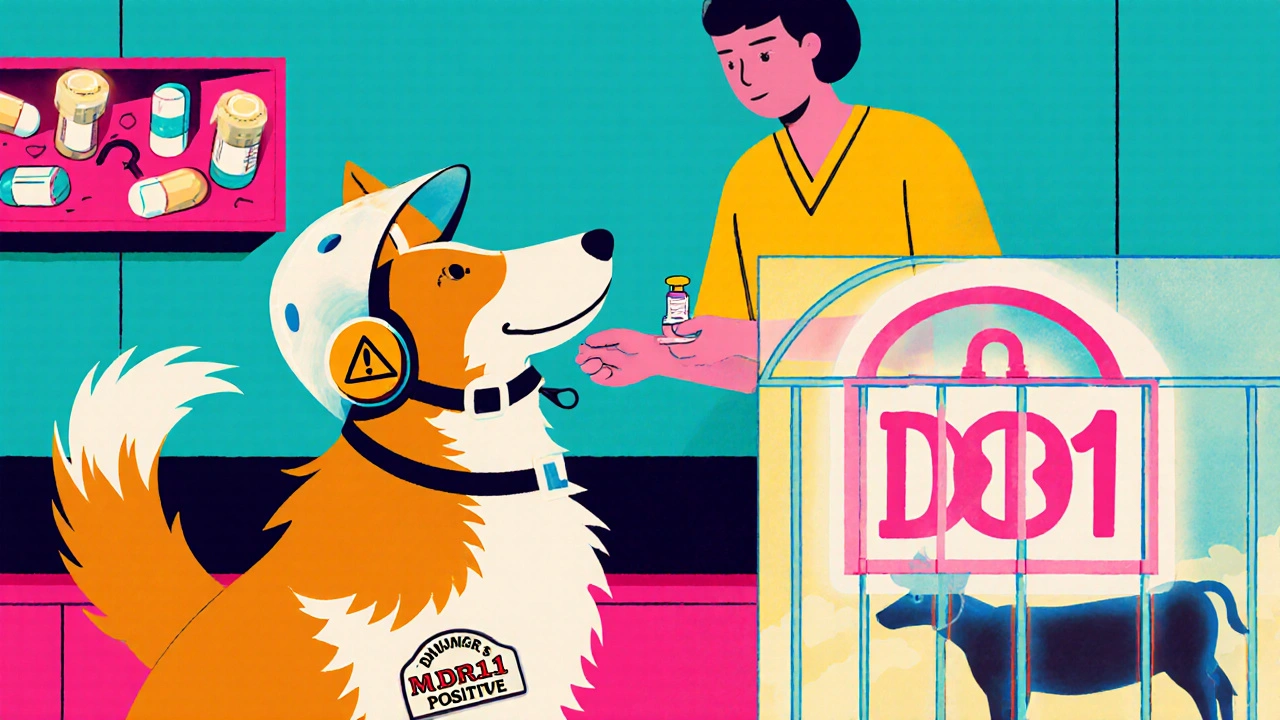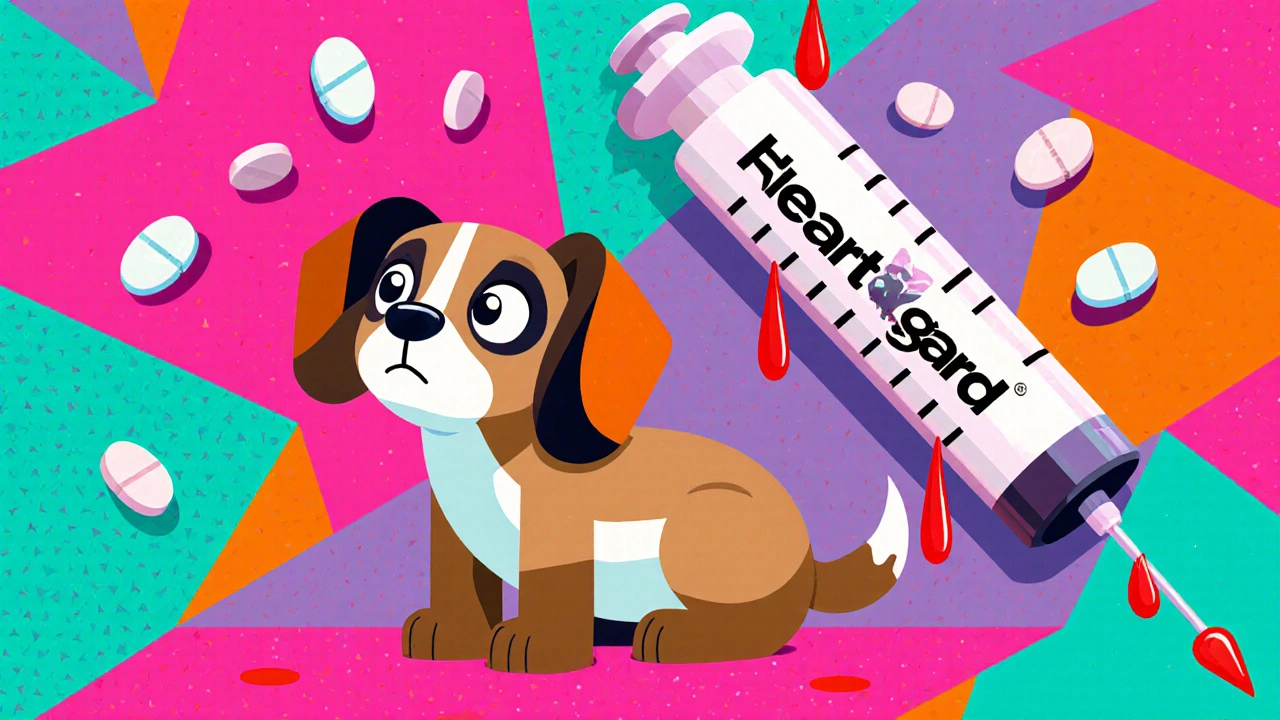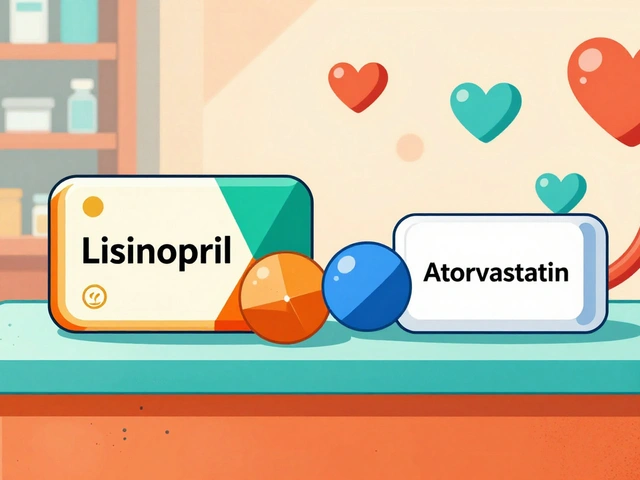Ivermectin is one of the most widely used medications in veterinary medicine. It’s not flashy, it doesn’t come in fancy packaging, and you won’t see ads for it on TV. But if you’ve ever owned a dog, horse, goat, or even a chicken, chances are you’ve relied on ivermectin to keep your animal healthy. It’s cheap, effective, and has saved countless lives - but only when used correctly.
What Is Ivermectin and How Does It Work?
Ivermectin is a broad-spectrum antiparasitic drug derived from a soil bacterium called Streptomyces avermitilis. It was first developed in the 1970s and earned a Nobel Prize in 2015 for its role in fighting river blindness in humans. In animals, it works by paralyzing and killing parasites - especially worms, mites, and lice - by overstimulating their nervous system.
It doesn’t just kill adult parasites. It also stops larvae from developing, which is why it’s so effective for long-term parasite control. Unlike some treatments that only target one type of bug, ivermectin hits a wide range: heartworms in dogs, mange mites in cats, internal worms in goats, and even lice in cattle.
Common Uses in Different Animals
Every species reacts differently to ivermectin. What’s safe for a horse can be deadly for a dog - especially certain breeds.
- Dogs: Used to prevent heartworm disease (as part of monthly preventatives like Heartgard). Also used off-label to treat sarcoptic mange and demodectic mange. Dosage varies: heartworm prevention uses micrograms per kg, while mange treatment may require 10-100 times more.
- Cats: Rarely used due to sensitivity. Sometimes given for ear mites or mange, but only in very low, carefully calculated doses. Many vets avoid it entirely and use safer alternatives like selamectin.
- Horses: A staple in deworming programs. Effective against roundworms, bots, and pinworms. Often given as a paste every 6-12 weeks, depending on climate and pasture conditions.
- Goats and Sheep: Used for gastrointestinal worms and lice. Often given orally or by injection. Resistance is a growing problem, so rotation with other dewormers is recommended.
- Poultry: Used off-label for mites and lice. Applied topically or mixed in water. Not approved for food-producing birds in many countries, so withdrawal periods must be strictly followed.
- Rabbits and Rodents: Used cautiously for mites. Too high a dose can cause neurological damage or death.
Dosage Matters - Too Much Can Kill
One of the biggest mistakes pet owners make is using human ivermectin or livestock formulations on small animals. A single drop of horse paste can be lethal to a small dog.
For example:
- A 5 kg dog needs about 0.1 mg/kg for heartworm prevention - that’s 0.5 mg total.
- A single 1.87% horse paste tube contains 136 mg of ivermectin - enough to kill 270 dogs of that size.
Even within breeds, sensitivity varies. Collies, Australian Shepherds, Shetland Sheepdogs, and other herding breeds often carry a genetic mutation (MDR1 gene) that makes them unable to properly clear ivermectin from their brains. This can lead to severe neurological toxicity: tremors, blindness, coma, even death.
Always test for the MDR1 mutation before using ivermectin on these breeds. Many vets now skip ivermectin entirely and use moxidectin or milbemycin for heartworm prevention in sensitive dogs.
Side Effects and Risks
When used correctly, ivermectin is very safe. But overdoses or misuse can cause serious problems:
- Loss of coordination
- Excessive drooling
- Blindness or dilated pupils
- Seizures
- Coma or death
These signs usually show up within hours of an overdose. If your pet shows any of these symptoms after ivermectin use, get to a vet immediately. There’s no antidote, but supportive care - IV fluids, temperature control, and monitoring - can save lives.
Another risk: using expired or improperly stored ivermectin. Heat and moisture break down the active ingredient. A degraded product might not work at all, leaving your animal vulnerable to parasites - or it might become unpredictable in potency.
Resistance Is Real
Parasites are getting smarter. In goats, sheep, and horses, some worm populations have developed resistance to ivermectin. This isn’t because the drug is weak - it’s because it’s been overused.
Many farmers and backyard animal owners deworm on a fixed schedule, like clockwork, whether their animals have worms or not. That’s a recipe for resistance. Instead, use fecal egg counts to test for parasites before treating. Only deworm animals that actually need it. Rotate drug classes - use benzimidazoles or levamisole alongside ivermectin to slow resistance.
In Australia, where pasture-based livestock is common, resistance is already widespread in some regions. Vets now recommend targeted selective treatment rather than blanket deworming.
What to Avoid
Don’t use:
- Human ivermectin tablets for animals - concentrations are wrong and fillers can be toxic
- Leftover livestock injectables for pets - too concentrated, wrong route of administration
- Online "natural" ivermectin alternatives - no evidence they work
- Extra doses "just to be safe" - more isn’t better
Also, never use ivermectin in pregnant animals without vet approval. While it’s generally considered safe in late-term pregnancy for horses and goats, it’s not risk-free.

When to Call the Vet
You don’t need to be a vet to use ivermectin safely - but you do need to know when to stop guessing.
Call your vet if:
- Your animal has never had ivermectin before
- You’re unsure of the correct dosage
- Your animal is a herding breed (Collie, Aussie, etc.)
- You’re treating a pregnant or very young animal
- Your pet shows any unusual behavior after dosing
Most vets will give you a pre-measured dose or write a prescription for a safe, vet-approved product. It’s worth the small cost. A single mistake can cost you your pet.
Alternatives to Ivermectin
There are other options, especially for animals sensitive to ivermectin:
- Moxidectin: Similar to ivermectin but less likely to cross the blood-brain barrier. Safer for MDR1-positive dogs. Used in ProHeart injections for heartworm prevention.
- Revolution (selamectin): Topical for cats and dogs. Treats fleas, ear mites, and some worms. No risk of overdose from licking.
- Drontal, Panacur (fenbendazole): Oral dewormers for intestinal parasites. Often used in goats and sheep as a rotation partner.
- Permethrin sprays: For external parasites like lice in poultry and livestock. Not for cats - they’re highly toxic to felines.
The best approach? Work with your vet to build a parasite control plan tailored to your animal’s species, age, environment, and risk level.
Final Thoughts
Ivermectin isn’t magic. It’s a tool. A powerful one - but only when used with care, knowledge, and respect. It’s saved millions of animals from debilitating parasites. But it’s also killed thousands because people assumed it was harmless.
If you’re using ivermectin on your animals, make sure you know the exact species, weight, and formulation. Keep records. Store it properly. Watch for reactions. And when in doubt - ask your vet. There’s no shame in getting help. Your animal’s life depends on it.
Can I give my dog ivermectin meant for horses?
No. Horse ivermectin is formulated at concentrations up to 100 times higher than what’s safe for dogs. Even a tiny amount can cause fatal neurological toxicity, especially in herding breeds. Always use vet-prescribed products labeled for dogs.
Is ivermectin safe for cats?
It’s rarely used and only in very low, precise doses under veterinary supervision. Cats are extremely sensitive to ivermectin. Most vets prefer selamectin (Revolution) for treating ear mites or fleas because it’s safer and just as effective.
How often should I deworm my horse with ivermectin?
Every 6 to 12 weeks, depending on your region, season, and pasture management. But many vets now recommend fecal egg counts first. Only treat if eggs are present. Overuse leads to parasite resistance.
Can ivermectin treat fleas in dogs?
No. Ivermectin doesn’t kill adult fleas. It targets internal worms and some external mites, but not fleas. Use flea-specific treatments like spinosad, imidacloprid, or topical spot-ons.
What should I do if my dog accidentally ingests too much ivermectin?
Get to a vet immediately. Do not wait for symptoms. Time is critical. Bring the packaging or container of the product so the vet knows the concentration and amount ingested. Supportive care is the only treatment - no antidote exists.



November 7, 2025 AT 06:04 AM
so i got my dog some ivermectin from the farm store cuz i saw a video online saying it works great for mites and honestly i thought it was just like giving him a pill for worms
turns out i almost killed him. he started trembling and couldn't stand
took him to the vet and they said it was the horse paste i used. like, one drop was enough to wreck his nervous system
i didn't even know dogs could be sensitive like that. now i always check with my vet first. dumb mistake but i'm alive and so is my pup.
if you're thinking of doing this at home, just don't. it's not worth it.
November 7, 2025 AT 09:34 AM
ivermectin is a lifesaver when used right. i've been raising goats for 12 years and this stuff keeps my herd healthy through winter
but yeah, resistance is real. we switched to fecal testing and now only treat when needed
also rotate with fenbendazole. keeps the worms on their toes
November 7, 2025 AT 10:21 AM
my cousin gave his cat ivermectin from a dog bottle and now the cat is blind in one eye
how is this even still a thing? people just google and wing it
cats are not dogs. dogs are not horses. stop being lazy
November 8, 2025 AT 12:34 PM
i’ve been a vet tech for 18 years and i’ve seen too many pets hurt because someone thought ‘natural’ meant ‘safe’
ivermectin isn’t magic, but it’s not candy either
the real hero here is the vet who takes the time to explain dosage, breed risks, and alternatives
if you’re reading this and you’re new to animal care - don’t be afraid to ask questions. we’re here to help, not judge.
your pet’s life isn’t a gamble. use the tools right.
November 9, 2025 AT 14:30 PM
in india we use ivermectin for cattle and goats all the time
but we also know that if you give it wrong, they die
so we learn from elders, we test feces, we don’t guess
you don’t need a PhD to do this right, just respect the medicine
and never use horse paste on a sheep. trust me
November 11, 2025 AT 05:49 AM
why do people even use ivermectin anymore? there are so many better options now
like selamectin or moxidectin - safer, easier, no brain toxicity risk
and yet everyone clings to this 40-year-old drug like it’s the only thing that works
it’s not. it’s just cheap and familiar
and that’s why animals keep dying
November 12, 2025 AT 15:34 PM
Oh. My. GOD. Did you see that one guy who gave his Chihuahua horse paste because he ‘read it on Reddit’? 🤦♂️
And now he’s crying on TikTok because his dog is in a coma?
Look - ivermectin is not a DIY project. It’s a precision instrument. You don’t use a chainsaw to trim your bonsai.
And if you think ‘natural’ remedies work better - go ahead and bury your pet in the backyard. I’ll send flowers.
Also, MDR1 mutation? If you don’t know what that is, stop Googling and call your vet. Now.
November 13, 2025 AT 13:25 PM
i used to think ivermectin was harmless until my neighbor’s dog had a seizure after a dose
now i always ask my vet for a written dosage sheet
and i never, ever use anything not labeled for the exact animal
it’s not about being paranoid - it’s about being responsible
your pet trusts you. don’t betray that
November 15, 2025 AT 02:28 AM
soooo… ivermectin = Big Vet Conspiracy? 😏
why is this drug so cheap? why does no one advertise it? why is it used in humans for river blindness but banned for COVID?
you tell me… what’s the real story here? 🤔
also, my goat got worms after using it - maybe it’s not working anymore? maybe it’s all fake? 🤨
November 16, 2025 AT 09:27 AM
It is imperative to underscore that veterinary pharmaceuticals must be administered strictly in accordance with species-specific pharmacokinetic parameters. Ivermectin, while efficacious against a broad spectrum of endo- and ectoparasites, exhibits marked differential toxicity profiles across taxa. The MDR1 gene polymorphism in canines, particularly in herding breeds, necessitates pre-treatment genotyping to mitigate neurotoxic risk. Furthermore, the off-label use of livestock formulations constitutes a significant public health and animal welfare concern. Adherence to veterinary guidelines is not optional - it is ethically and legally obligatory.
November 18, 2025 AT 08:10 AM
i wonder how many people realize that ivermectin was originally discovered from soil bacteria… like, nature made it
and now we’re using it to save lives - but also killing animals because we don’t respect how powerful it is
it’s kind of like fire. useful when controlled, deadly when ignored
maybe the real problem isn’t the drug - it’s how we treat knowledge
we want quick fixes, not education
November 19, 2025 AT 03:30 AM
used to be a farmer in Scotland - we used ivermectin every spring and fall, always with fecal tests
got to know each of our sheep by name, and we treated them like family
it’s not about being cheap or lazy - it’s about being smart
if you don’t know how to use it, don’t touch it
your animal deserves better
November 19, 2025 AT 10:43 AM
so ivermectin is ‘safe’… but only if you’re white and have a vet who speaks English?
what about people in rural areas who can’t afford a vet?
why is this drug available at the feed store if it’s so dangerous?
and why do we treat it like it’s some kind of miracle cure when it’s just another chemical?
maybe the problem isn’t the people using it - maybe it’s the system that lets it be sold like candy
November 20, 2025 AT 09:26 AM
the prevalence of ivermectin misuse is a direct consequence of the commodification of veterinary care and the erosion of clinical oversight. The MDR1 mutation, while well-documented in veterinary literature since 1990, remains underutilized in diagnostic protocols due to cost inefficiencies and systemic negligence. Furthermore, the proliferation of unregulated online pharmacopeias has enabled the commodification of toxic formulations under the guise of ‘alternative medicine.’ This is not negligence - it is malpractice enabled by capitalism.
November 22, 2025 AT 09:04 AM
why are we even talking about this? in America we have better medicine than this
why are we using some old drug from the 70s when we have fancy new stuff?
also, why do people think it’s okay to use horse stuff on dogs? that’s just dumb
if you can’t afford a vet, get a job - don’t poison your pet
November 23, 2025 AT 10:47 AM
my dog got ivermectin for heartworm and now he’s the happiest pup ever 🐶💖
also my chickens don’t have lice anymore 🐔🔥
if you’re scared, just don’t do it - but don’t scare others either 😘
November 24, 2025 AT 11:44 AM
so i used the goat ivermectin on my rabbit and he died
oops
guess i shoulda read the label
or maybe i shoulda not listened to that guy on YouTube
rest in peace, thumper